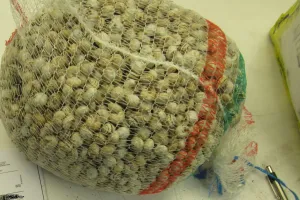MEMPHIS - On Friday, July 15, U.S. Customs and Border Protection (CBP) Agriculture Specialists at the port of Memphis, TN intercepted four kilos of live snails from Italy en route to New Jersey. The shipment from the Sicilian city of Palermo was manifested as olives, chocolate cream candies and bread. However, an x-ray inspection revealed anomalies in the shipment, and the box of snails was discovered along with the other permissible food items.
U.S. Department of Agriculture identified the snails as Theba pisana, commonly known as white garden snail, white Italian snail, Mediterranean coastal snail, or simply the Mediterranean snail. It is a common, edible species of medium-sized, air-breathing land snail. It is a prohibited pest under 7 CFR 330.200 (organism restrictions) and was referred for destruction.
This species of mollusk is deemed as a serious pest due to its ability to rapidly aggregate. They can defoliate large trees, such as citrus, and may also consumes grain crops. Mollusks can also spread infections when feeding on crops by infecting the grain with a secondary fungal pathogen. The snails were destroyed by steam sterilization under the supervision of CBP agriculture specialists.
“Our agriculture specialists are highly skilled in preventing shippers’ attempts to circumvent U.S. laws and regulations regarding agriculture importations,” said Acting Area Port Director Michael R. Johnson. “Judging from the plethora of Italian restaurants near the snail’s destination, they may have ended up on someone’s plate, but they were both a restricted organism and mis-manifested. U.S. laws need to be followed and my officers are there to vigilantly enforce them.”
On a Typical Day in Fiscal Year 2021, CBP discovered 264 pests at U.S. ports of entry and 2,548 materials for quarantine: plant, meat, animal byproduct, and soil.
The New Orleans Field Office covers ports of entry throughout the states of Louisiana, Mississippi, Alabama, Arkansas, and Tennessee.
Follow CBP on Twitter @CBPGulfCoast


